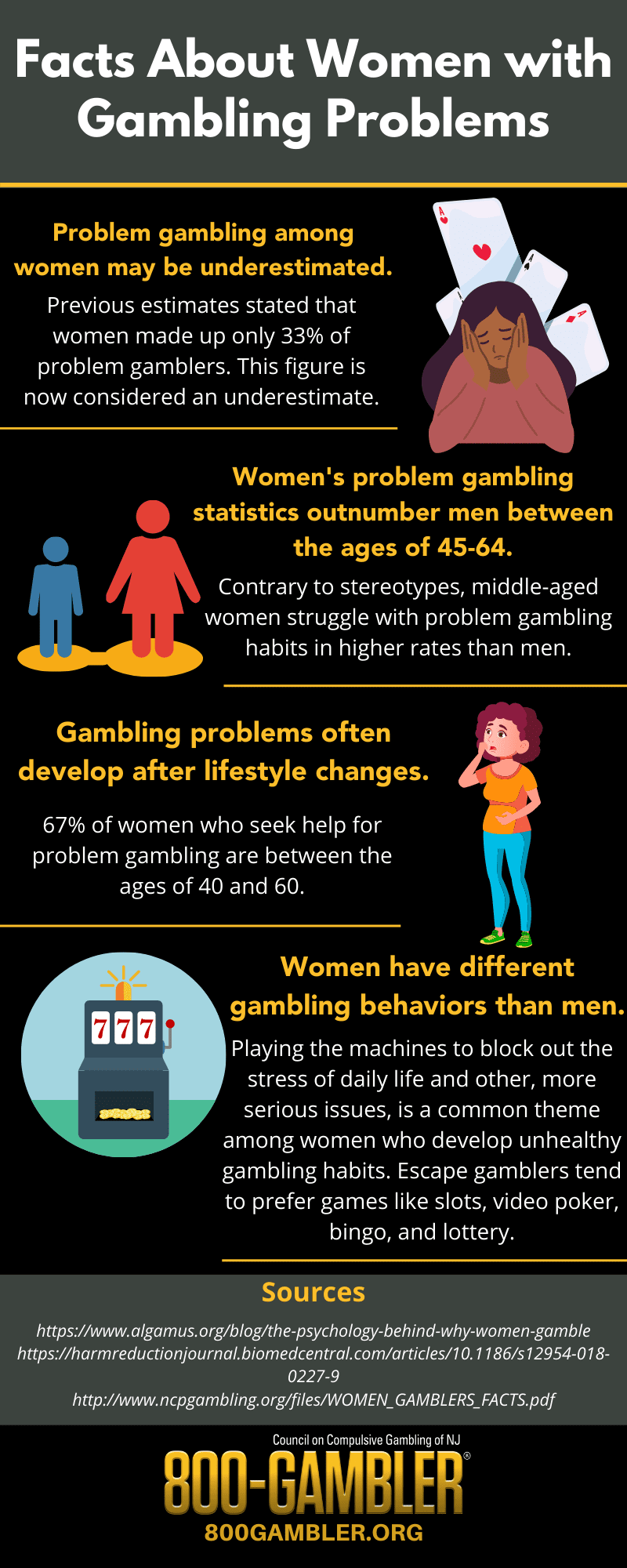We aim to demystify gambling statistics and lift the stigma surrounding problem gambling. Part of that mission includes eliminating the existing mental image that the average person with problem gambling tendencies is a white, middle-class, employed man.
Problem gambling is a pervasive, destructive, and often all-consuming issue that doesn’t discriminate based on gender, race, or income bracket. You also can’t tell who is and who isn’t struggling with gambling problems just by looking at them. For this reason, women with gambling problems are often overlooked. Let’s dig into some of the lesser discussed statistics of gambling in women and where those inclinations may stem from.

Gambling problems are enabled by secrecy and social isolation.
One of the reasons that problem gambling is understudied and underreported is due to the secrecy that surrounds the activity. Women tend to be embarrassed by their mental health struggles and may try to hide what they’ve been doing. Many women also start gambling later in life, sometimes after their children have left the nest or if their relationship with their spouse has become more distant.
Women who gamble are also more likely to have been victims of abuse and other trauma. This is compounded for women who have a family history of substance misuse.
Women gamble for different reasons than men.
While gambling is regarded as a pastime to unwind from the stressors of daily life for both genders, in general, men gamble with the intention of winning, but women are known as “escape gamblers.” What this means is that women play for the thrill of playing — not necessarily for the thrill of winning. According to the National Council on Problem Gambling, 95% of women who gamble were considered escape gamblers. For women struggling with a lifestyle change, gambling becomes a way to pass the time, forget about other problems, and relieve boredom.
Compared to men, women engage in fewer types of gambling. Though this is not a one-size-fits-all analysis, women are more likely to prefer the glamour of casinos and long-distance trips to casinos and cruises.
According to a 2018 article published in the Harm Reduction Journal, women are most likely to engage in and have problems with casino gambling, electronic gambling machines, and online gaming.
Barriers to Treatment
The stigma surrounding gambling problems as well as gender roles and societal norms can create unique barriers to treatment for women. In general, women develop an interest in gambling later in their lives than men, but they’re more likely to report financial issues and engage in “telescoping.” Telescoping is the rapid development of problem gambling due to continuous playing and reinforcement.
Women are more likely to be attuned to the shame of breaching their social and personal values. Women tend to identify as caretakers, and there can be a lot of guilt surrounding lost money, financial insecurity, jeopardizing their employment, and time spent away from the family unit.
Even the existing stereotypes of male gamblers are a barrier to treatment. Because so much of the media surrounding problem gambling is geared towards men, women may receive misinformation or feel that the available information doesn’t apply to them. Women are also less likely to attend in-person meetings such as Gamblers Anonymous because these spaces tend to be male-dominated. These environments come with the fear of potentially being inappropriately approached by men, being judged for playing “non-skilled” games, and the challenge of being able to open up about substance or alcohol misuse and trauma history.
If you or a loved one are struggling with problem gambling, help is available. Call or text our 24/7 confidential helpline today at 800-GAMBLER. Our team is always available to connect you with local resources and set you on a meaningful path to recovery.
Sources:
http://www.ncpgambling.org/files/WOMEN_GAMBLERS_FACTS.pdf
https://www.algamus.org/blog/the-psychology-behind-why-women-gamble
https://harmreductionjournal.biomedcentral.com/articles/10.1186/s12954-018-0227-9



